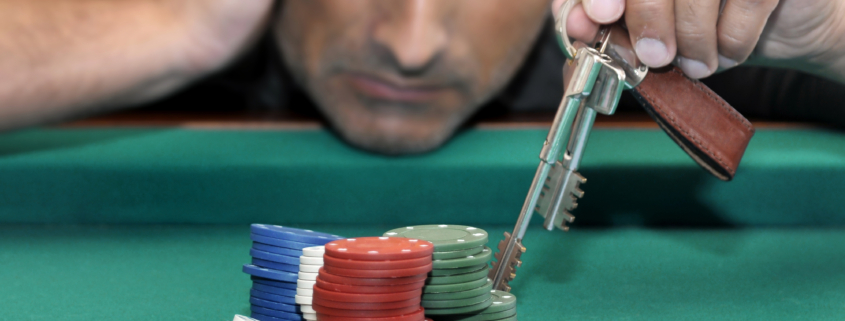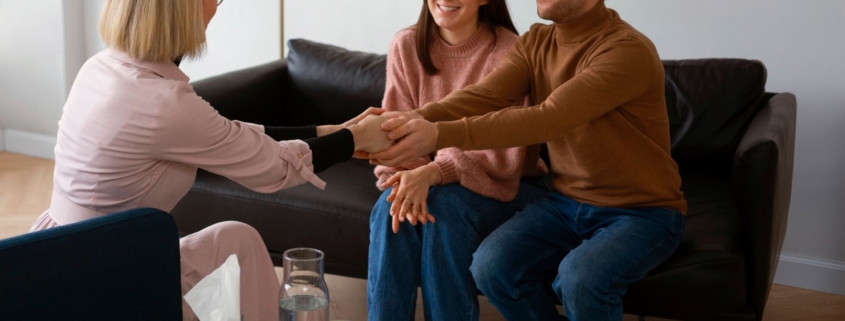When battling addiction, the journey to recovery is challenging—but it becomes uniquely complex when both partners in a relationship are affected. Couples Rehab, located in Orange County, specializes in helping couples navigate the intricacies of healing together. A cornerstone of their approach is setting joint recovery goals, a strategy that fosters mutual support, accountability, and long-term success. In this article, we’ll explore why joint recovery goals are crucial, how they shape the recovery journey, and how Couples Rehab provides the tools for lasting change.
Why Joint Recovery Goals Matter in Couples Rehab
Addiction doesn’t just affect individuals; it seeps into relationships, eroding trust, communication, and emotional stability. For couples, recovery isn’t just about individual healing—it’s about rebuilding a partnership that has been strained by substance use.
Joint recovery goals provide a shared focus, aligning partners in their commitment to sobriety and relationship repair. These goals serve as a roadmap, guiding couples through the ups and downs of recovery while emphasizing mutual accountability.
At Couples Rehab in Orange County, therapists emphasize the importance of these shared goals to:
- Rebuild Trust: Addiction often damages trust. Setting and achieving joint goals demonstrates reliability and fosters confidence in one another.
- Enhance Communication: Working toward shared objectives requires open and honest dialogue, a skill that’s crucial for long-term relationship health.
- Strengthen Emotional Bonds: The process of recovery becomes a unifying experience, reinforcing the emotional connection between partners.
What Are Joint Recovery Goals?
Joint recovery goals are objectives that couples set together as part of their treatment plan. These goals extend beyond sobriety, addressing the emotional, psychological, and relational aspects of recovery.
Some common examples include:
- Maintaining Sobriety Together: Partners pledge to abstain from substance use and support one another in moments of vulnerability.
- Attending Therapy Sessions: Consistently participating in couples counseling and individual therapy to address underlying issues.
- Developing Healthy Coping Mechanisms: Replacing destructive behaviors with positive habits, such as exercise, mindfulness, or creative pursuits.
- Rebuilding Relationship Trust: Setting small, measurable steps to regain trust, such as keeping promises or practicing transparency.
- Establishing a Supportive Routine: Creating a daily structure that prioritizes sobriety, self-care, and quality time as a couple.
How Couples Rehab in Orange County Supports Joint Recovery Goals
Couples Rehab stands out as a premier addiction treatment center in Orange County, offering specialized programs tailored to the unique needs of couples. By integrating joint recovery goals into their treatment plans, they create a holistic approach that strengthens both individual and relational well-being.
Personalized Treatment Plans
Every relationship is unique, and so is every recovery journey. Couples Rehab takes the time to understand each couple’s dynamic, challenges, and strengths, designing a customized treatment plan that aligns with their goals.
Couples Therapy Sessions
Regular counseling sessions are the backbone of joint recovery. At Couples Rehab, experienced therapists guide couples through:
- Conflict resolution techniques
- Communication skill-building
- Addressing underlying issues such as trauma or codependency
These sessions create a safe space for partners to express their feelings, learn to navigate challenges, and work toward shared goals.
Dual Diagnosis Treatment
Substance use disorders often coexist with mental health challenges like anxiety, depression, or PTSD. Couples Rehab provides dual diagnosis treatment, ensuring that both partners receive comprehensive care for their mental and emotional health alongside addiction recovery.
Workshops and Group Therapy
Beyond individual and couples therapy, Couples Rehab offers workshops and group sessions that promote community and shared learning. These programs often include topics like:
- Stress management for couples
- Rebuilding intimacy after addiction
- Setting and achieving recovery milestones
The Role of Accountability in Joint Recovery Goals
One of the most powerful aspects of setting joint goals is the built-in accountability system. When couples commit to a shared vision, they naturally hold each other responsible for progress.
Mutual Motivation
Recovery can be daunting, but having a partner by your side can be a source of strength. When one person feels discouraged, the other can provide encouragement, ensuring that both partners stay on track.
Celebrating Milestones Together
Small victories matter in recovery. Whether it’s attending therapy consistently for a month or achieving a year of sobriety, celebrating these milestones together reinforces the partnership and commitment to a healthier life.
Overcoming Challenges as a Team
Relapses and setbacks are common in addiction recovery, but they don’t have to derail progress. Couples who set joint goals are better equipped to face these challenges, viewing them as opportunities to grow rather than failures.
Real-Life Benefits of Joint Recovery Goals
Couples who embrace joint recovery goals often find that the benefits extend far beyond sobriety. Some of the most significant outcomes include:
Improved Relationship Dynamics
Couples learn to communicate more effectively, resolve conflicts constructively, and support each other’s personal growth.
Stronger Emotional Intimacy
The shared journey of recovery fosters a deeper emotional connection, allowing partners to rebuild trust and rediscover intimacy.
Healthier Coping Strategies
By addressing the root causes of addiction and learning new coping mechanisms, couples create a healthier, more balanced relationship dynamic.
Long-Term Sobriety
Studies show that individuals in committed relationships are more likely to achieve and maintain sobriety when their partner is actively involved in the recovery process.
Tailored Programs for Couples in Orange County
Couples Rehab’s location in beautiful Orange County offers a serene and supportive environment for recovery. The center’s tailored programs include:
- Detox Services: Safe and medically supervised detoxification for individuals starting their recovery journey.
- Inpatient Treatment: Comprehensive residential programs that provide 24/7 care and support.
- Outpatient Treatment: Flexible programs that allow couples to continue therapy while managing work and family responsibilities.
- Aftercare Planning: Ongoing support and resources to help couples maintain their recovery goals after completing treatment.
The Healing Power of Location: Why Orange County is Ideal for Couples Rehab
Orange County isn’t just a picturesque destination—it’s a healing haven. The tranquil beaches, temperate climate, and peaceful surroundings create the perfect backdrop for recovery.
Couples Rehab leverages this environment to enhance the recovery experience, offering outdoor activities, mindfulness exercises, and opportunities to reconnect with nature. These experiences complement the therapeutic process, promoting relaxation and mental clarity.

How to Get Started at Couples Rehab in Orange County
Taking the first step toward recovery can feel overwhelming, but Couples Rehab is here to guide you. Their compassionate team provides:
- A free and confidential consultation to assess your needs
- A clear explanation of treatment options and programs
- Support every step of the way, from admission to aftercare
Frequently Asked Questions (FAQ) About Couples Rehab in Orange County
1. What is couples rehab, and how does it work?
Couples rehab is a specialized form of addiction treatment designed for partners who want to recover together. At Couples Rehab in Orange County, the program combines individual and couples therapy, addressing both personal and relationship challenges related to substance use. The goal is to help both partners achieve sobriety, rebuild trust, and establish a healthier relationship dynamic.
Therapists work closely with couples to create customized treatment plans, focusing on joint recovery goals, communication strategies, and long-term sobriety.
2. What types of addiction does Couples Rehab treat?
Couples Rehab in Orange County provides comprehensive treatment for a wide range of addictions, including:
- Alcohol addiction
- Opioid addiction
- Prescription drug misuse
- Stimulant addiction
- Marijuana dependence
- Co-occurring substance use disorders
The center also addresses mental health conditions like anxiety, depression, and PTSD, which often accompany addiction.
3. Can couples go to rehab together?
Yes, couples can and should seek treatment together if they are both committed to recovery. Couples Rehab in Orange County is specifically designed to support partners as they navigate the complexities of addiction recovery. Joint treatment programs emphasize mutual support, accountability, and rebuilding trust, offering a more comprehensive approach than individual therapy alone.
4. What are the benefits of joint recovery goals in couples rehab?
Joint recovery goals provide a shared focus for couples, enhancing communication, trust, and emotional connection. Key benefits include:
- Improved Communication: Partners learn to express their needs and emotions effectively.
- Stronger Accountability: Mutual goals keep both individuals motivated and committed.
- Rebuilt Trust: Working toward shared objectives helps repair relationships strained by addiction.
- Long-Term Sobriety: Couples who recover together often experience lower relapse rates.
5. Does Couples Rehab offer dual diagnosis treatment?
Yes, Couples Rehab in Orange County provides dual diagnosis treatment, addressing both addiction and co-occurring mental health disorders. This integrated approach ensures that both partners receive comprehensive care for conditions like anxiety, depression, bipolar disorder, or PTSD, which often contribute to substance use.
6. What services are included in the Couples Rehab program?
Couples Rehab offers a wide range of services tailored to the unique needs of couples, including:
- Medical detoxification
- Individual and couples therapy
- Group therapy and workshops
- Cognitive-behavioral therapy (CBT)
- Dialectical behavior therapy (DBT)
- Family therapy
- Aftercare planning
These services are designed to help couples achieve sobriety, rebuild their relationship, and maintain long-term recovery.
7. How long does a couples rehab program last?
The length of a couples rehab program varies based on the needs of each couple. At Couples Rehab in Orange County, treatment plans typically include:
- Detox: 7–10 days, depending on the severity of addiction.
- Inpatient Treatment: 30, 60, or 90 days, depending on progress and goals.
- Outpatient Treatment: Flexible durations to accommodate work or family commitments.
Therapists work with couples to determine the best timeline for their recovery journey.
8. What happens if one partner relapses during treatment?
Relapse is a common part of recovery, and it doesn’t mean failure. If one partner relapses, Couples Rehab provides additional support to address the issue. Therapists help both individuals navigate the situation, reinforcing their joint recovery goals and adjusting the treatment plan as needed.
Relapses are treated as learning opportunities, with a focus on strengthening coping mechanisms and rebuilding trust.
9. Why choose Couples Rehab in Orange County?
Couples Rehab in Orange County stands out for its comprehensive, couple-focused approach to addiction treatment. Key advantages include:
- Customized Treatment Plans: Programs tailored to each couple’s unique needs.
- Expert Therapists: Licensed professionals specializing in addiction and relationship dynamics.
- Holistic Care: Addressing physical, emotional, and relational aspects of recovery.
- Serene Location: Orange County’s tranquil environment enhances the healing process.
Choosing Couples Rehab means investing in a brighter, healthier future for both partners.
10. How can we get started with Couples Rehab in Orange County?
Getting started at Couples Rehab is simple:
- Contact the Team: Reach out for a free and confidential consultation.
- Assessment: Schedule an initial assessment to determine your needs and goals.
- Treatment Plan: Work with therapists to design a personalized program.
- Begin Treatment: Start your recovery journey in a supportive and compassionate environment.
Conclusion
Recovery is a journey, not a destination—and for couples, it’s a journey best undertaken together. Joint recovery goals are the foundation of a successful partnership in sobriety, fostering trust, communication, and resilience.
At Couples Rehab in Orange County, couples find the tools, support, and guidance they need to rebuild their lives and relationships. With tailored programs, expert care, and a serene environment, Couples Rehab is dedicated to helping couples achieve lasting recovery and rediscover the joy of a healthy, fulfilling partnership.
Whether you’re taking your first steps toward sobriety or seeking to strengthen your relationship after addiction, Couples Rehab is here to help. Contact our Orange County team today to learn more about their programs and start your journey toward joint recovery goals.


















